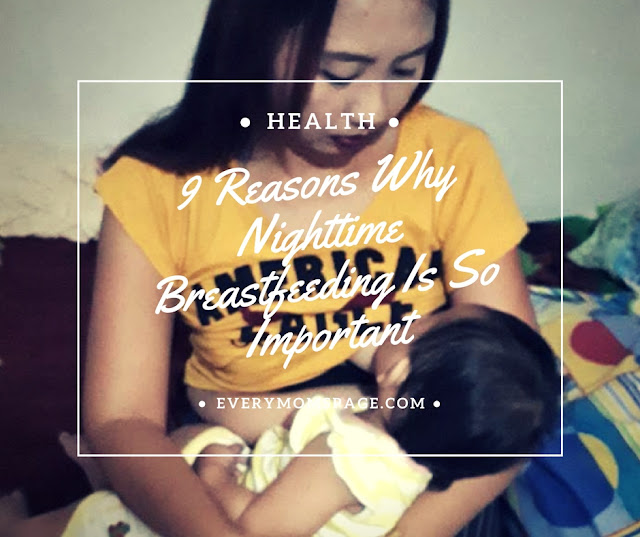9 Reasons Why Nighttime Breastfeeding Is So Important
While quite a few women struggle with sleep
deprivation, nighttime breastfeeding is very important due to several reasons.
In fact, lack of sleep if one of the main issues most mothers mention when asked about the sweet nuisances
regarding breastfeeding in general. Even though it can be quite challenging to
sacrifice sleep, but the truth is, no matter how you feel at any given moment,
the most important thing is to keep your new baby fed and happy.
By understanding the benefits of nighttime
breastfeeding, you can help yourself cope better with the lack of sleep and
other tiny sacrifices that await you in this journey.
Babies struggle with capacity
A newborn baby can hold up to 20ml of fluid
in its tummy. As one can assume, that’s not a lot of fluid at all. Needless to say, their stomachs get emptied
within an hour or two. Usually, the feeding pattern for newborn babies is every
one to two hours, depending on their metabolism.
The problem here is that the baby’s
metabolism doesn’t differentiate daytime from nighttime meaning they don’t care
whether you’re sleeping or not, if they are hungry you can rest assured that
you’ll be aware of it.
The solution is quite obvious – don’t skip
the nighttime feeding session or else you may end up jeopardizing your
newborn’s well-being as well as create issues with their metabolism. This is, of course, a simplified explanation of
potential issues which are much more severe than one might think. Luckily,
frequent and regular breastfeeding sessions help to improve your milk-producing
capabilities.
Total intake ratio
Many people don’t think about the total
intake ratio of milk which is essential and crucial for the proper development
of your newborn. To simplify things a bit – the rule of thumb here is that the
nighttime sessions make a significant percentage of your baby’s overall daily
intake of milk. Recent research has shown
that about 20% of your child’s 24-hour milk intake is from night feeds.
Therefore, if you were to stop feeding your
baby at night, you would potentially cut up to 20% of their daily milk intake,
which would have catastrophic consequences. You should never
give your child regular food in order to
make up for a skipped breastfeeding session.
It helps babies sleep
All human beings have a circadian rhythm
which is a biological process that displays various oscillations within 24
hours. In other words – it’s our internal body clock. Now, contrary to popular
belief, babies also have an internal clock regardless of the fact that they are
barely conscious and aware of their surroundings.
In fact, the main goal of most newborn
babies is to eat and sleep. However, that doesn’t mean they don’t have an
internal body clock and that it should be
neglected.
Tryptophan is an amino acid found in breast
milk which is used by the body to create melatonin. Melatonin is a hormone
responsible for sleep regulation. The main thing here to remember is that
tryptophan levels fluctuate according to the mother’s circadian rhythm.
Therefore, one can draw a simple conclusion that breastfeeding at night can
help and stimulate the babies biological rhythms.
It is essential for LAM
Lactational Amenorrhea Method (also known as
LAM) is very effective at preventing pregnancy. If you breastfeed your child on
a regular basis and if your menstrual cycle hasn’t returned, you can use LAM as
an effective contraceptive method. It’s also not uncommon for women to get
their menstrual cycles back by reducing nighttime breastfeeding.
Therefore, if you’re not planning on
getting pregnant in the first 5-6 months after labor, nighttime breastfeeding
can help reduce the risks.
However, keep in mind that this isn’t a
method that guarantees a 100% success rate. There is a certain percentage
margin for failure, and while it’s quite small,
it still shouldn’t be neglected. In case you’re determined not to get pregnant
too soon, you might want to include other contraceptive methods such as
condoms. Birth control
pills can cause issues, so make sure you’re aware of the risks
before using this particular method.
SIDS prevention
This is perhaps one of the most important reasons why you should embrace
or continue breastfeeding your child at night. SIDS stands for Sudden
Infant Death Syndrome, and it’s caused
by a combination of physical and sleep factors.
Now, there are arguments that breastfeeding
doesn’t directly decrease the risks of SIDS, but on the other hand, it’s proven that formula feeding does increase
the risk. From this point of view, it’s definitely
recommended and advised for all new mothers to breastfeed their children on a
regular basis and avoid substituting it with
various formulas.
This doesn’t mean that you should avoid formula feeding at all costs,
but a fine balance is necessary or else you might expose your child to various
life-threatening risks.
Mothers who breastfeed actually
get more sleep
While it’s hard to believe at first, women
who exclusively breastfeed their children get more sleep in comparison to
mother’s who combine breastfeeding with formulas. Since the math behind this
claim is pretty complex, the simplest explanation would be – mothers that
practice mixed feeding have less time for sleep.
The thing that discourages most new moms is
the fact that exclusive breastfeeding gets you only about 45 minutes more sleep
in comparison to mixed feeding. While 45 minutes doesn’t seem as much, you can
rest assured that it helps a lot when it comes to solving issues with sleep
deprivation.
Solutions for various issues
Nighttime breastfeeding isn’t easy; we can
all agree on that. However, there are plenty of tricks you can use in order to alleviate some of the pressure.
For example, using various accessories such
as breast pumps can make a huge difference and improve your overall experience
by a significant margin. Even though the manual
vs. electric breast pump dilemma is always a never-ending battle, having
either of those by your side is definitely
an improvement and a positive thing in general. However, these accessories
aren’t mandatory. You can use other methods
that are proven to help you get through the night.
The battle against insomnia
Many new moms experience post-labor issues
such as depression, insomnia, anxiety, and etcetera. While there are plenty of things
you can do in order to battle against
these conditions, nighttime breastfeeding is one of the easiest and most
effective ones, especially when it comes to alleviating issues with insomnia.
The idea behind this is pretty simple – the
more active you are during the night, the easier it will be for you to fall
asleep. Bear in mind, this is an incredibly simplified explanation of a complex
problem, and you should do some research before taking action against insomnia
or any other condition, especially in case you are breastfeeding on a regular
basis. Never take action on your own but instead consult a physician or someone
who is qualified to offer you an opinion. Taking
action on your own can and will result in
serious issues that are sometimes even life-threatening for your baby.
Constant vigilance
Even though this is a matter of common
sense, you would be surprised by the
number of people who don’t think about it at all. The idea here is quite
straightforward – the more you check on your baby, the less risk there is for
something to go wrong. Naturally, there are plenty of methods you can use in order to keep track of your child’s behavior
and well-being such as baby monitors, but it’s usually best to make sure
everything is okay in person.



